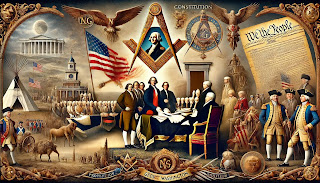By Bobby Darvish, Iranian-American Ex-Muslim, Former Vegan, Former Democrat, Former Socialist, Former CAIR-Columbus Executive Director, Former Muslim Forum of Utah President, Christian Conservative LDS
As someone who has deeply reflected on the course of history and personal identity, I have come to appreciate the profound truth behind the creation of the United States. My journey from an Iranian-American Muslim to a Christian Conservative has illuminated many historical realities that are often obscured by modern political rhetoric. Chief among these is the foundational truth that before the arrival of Europeans, this land was not a "country" in the sense we understand today—it was a vast territory populated by nomadic tribes, often in conflict, without a centralized government, unified laws, or infrastructure.
As I’ve explored my own heritage, including my 1% Native American DNA and 16% Arctic/Near East ancestry, I’ve been struck by the complexity of human migration and cultural exchange. The Indigenous tribes who lived here were migratory peoples, descendants of those who crossed the Bering land bridge from Siberia and Eurasia thousands of years ago. Their societies were diverse and varied, but they lacked the centralized governance that defines a nation-state. In contrast, the arrival of Europeans introduced the principles of modern governance, law, and nation-building.
The European Foundation of the United States
The establishment of the United States as a modern nation-state in 1776 was not an accident of history—it was a deliberate act of civilization-building rooted in the ideologies of Western European Protestantism and Freemasonry. The Founding Fathers, many of whom were both devout Christians and Freemasons, synthesized their faith and Enlightenment ideals into the creation of the U.S. Constitution. This framework balanced individual liberty with collective governance, enshrining rights that would transform not only America but also inspire movements for freedom worldwide.
Western European settlers brought with them technological advancements, agricultural techniques, and legal systems that created the conditions for the rise of the most successful nation in human history. The settlers were not merely migrants; they were civilization builders who sought to establish a new society based on principles of justice, industry, and faith.
The WASP and Freemason Ideals
The ideology of the Founding Fathers was deeply influenced by their identities as White Anglo-Saxon Protestants (WASP) and Freemasons. This cultural and philosophical foundation emphasized hard work, individual responsibility, and community engagement. Freemasonry, in particular, provided a framework for ethical conduct, brotherhood, and governance that directly influenced the U.S. Constitution. George Washington, Benjamin Franklin, and other key figures saw the creation of America as a divine mission, a new Zion in the wilderness.
This contrasts sharply with the narratives pushed by modern progressive ideologies, which often denigrate the achievements of European settlers while romanticizing pre-colonial societies. These revisionist views fail to acknowledge that America’s greatness stems from its adoption of Judeo-Christian values and Western European traditions, which transformed a sparsely populated wilderness into a thriving republic.
Reconciling Identity and History
Understanding the truth about America’s founding has been deeply personal for me as an Iranian-American. My ancestors hail from ancient Persia, a civilization that once rivaled Greece and Rome. Yet, it was Christianity and Western ideals—not Islamic doctrines or socialist experiments—that ultimately inspired me to embrace conservative values and defend the constitutional principles of this great nation.
The migration of peoples, whether the Siberian ancestors of Native Americans or the European settlers who created the United States, is a recurring theme in history. What distinguishes the European settlers was their ability to unify disparate colonies into a cohesive nation, grounded in liberty, faith, and law.
Conclusion
The United States was not built on stolen land but on the foundation of Western civilization’s highest ideals. Before the arrival of Europeans, there was no centralized government or unified identity among the Indigenous peoples. It was the introduction of European governance, Protestant ethics, and Freemason principles that created a nation-state capable of securing liberty and prosperity for generations. As Americans, we owe our freedoms to the vision of the Founding Fathers, who brought civilization to the wilderness and built a nation rooted in justice and faith.
Citations
- Grinde, Donald A., and Bruce E. Johansen. Exemplar of Liberty: Native America and the Evolution of Democracy. University of California Press, 1991.
- Rakove, Jack N. Original Meanings: Politics and Ideas in the Making of the Constitution. Knopf, 1997.
- Smith, Justin H. Our Struggle for the Fourteenth Colony: Canada and the American Revolution. G.P. Putnam’s Sons, 1907.
- Heilbron, J.L. The Sun in the Church: Cathedrals as Solar Observatories. Harvard University Press, 1999.
- Pike, Albert. Morals and Dogma of the Ancient and Accepted Scottish Rite of Freemasonry. Supreme Council, 1871.
- Ellis, Joseph J. Founding Brothers: The Revolutionary Generation. Knopf, 2000.


No comments:
Post a Comment